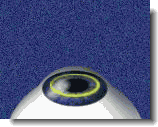
What Is Laser Eye Surgery?
You may have heard many stories about laser eye surgery, and that more and more people have decided to "take the plunge" and undergo the procedure to improve their quality of life. You know it has something to do with lasers, obviously, but what exactly does this laser do?
To fully understand the function of this laser, we must first understand why the most common eye disorders happen. The most common eye disorders (nearsightedness, farsightedness, and astigmatism) are caused by "refractive errors". Refractive errors are caused by a misshapen cornea (the transparent outer surface of the eye through which light travels as it enters the eye).
In laser eye surgery, a computer controlled device called an eximer laser essentially "reshapes" your cornea. In basic terms, the laser transfers your eyeglass or contact lens prescription onto the surface of your eye. The reshaping is accomplished through a process called photoablation, in which a precisely controlled beam of ultraviolet light is used to stimulate the molecules of your cornea to the point where certain targeted tissue molecules break and vaporize.
Different Surgical Techniques For Different Eye Disorders
When treating nearsightedness (where the cornea is too steep), the surgeon will remove tissue from the center of the cornea to flatten the surface. When treating farsightedness (where the cornea is too flat), tissue is removed from the outside perimeter of the area to make the central portion of the cornea effectively "steeper." For astigmatism, tissue is removed from the area of the cornea where it is unevenly shaped.
You can compare the cornea to the glass that covers a camera lens. If this "glass" is distorted in any way, it affects the "picture" that is projected onto your retina, and passed onto your brain as an image. Usually this problem is compensated for by corrective eyewear or contact lenses. (For more details, see the eye anatomy page).


"Vaporizing tissue?" This might sound quite extreme to you, especially when you consider how sensitive our eyes are to pain. But these are not the destructive laser beams you may have seen in science fiction movies. The eximer laser is on the "cool" end of the light spectrum, and can only remove a maximum of 0.25 microns of corneal tissue at a time. This is approximately 1/500th the thickness of a human hair. Since a human hair is about 125 microns thick, it would take 500 laser pulses to break through a human hair. Your cornea is about 500 to 600 microns in thickness, therefore it would take 2,000 laser pulses or more to break through your cornea! In most cases, the surgeon will remove between 10 and 160 microns of tissue to correct your vision problem, well within safety limits.
Much of the computational work is actually done by the software that comes from the manufacturer of the laser device. Your surgeon (or, in some cases, a technician) enters your "refractive numbers" into the software, which in turn calculates the exact number of pulses required to achieve the desired level of correction. These calculations can be adjusted by the surgeon depending on the specific needs of the patient i.e. the thickness of his or her cornea, etc. These adjustment factors are called nomograms. What the surgeon DOES perform manually are the nomograms and the exact location on the cornea where the laser is to be directed. It is very important that you choose a surgeon that has performed hundreds, or even better, thousands of laser eye procedures. This is covered in more detail on the following pages:
What Does The Surgeon Actually Do?
These Are Not "Star Wars" Lasers
You can watch a close-up movie of a real laser eye surgery here:
Laser Eye Surgery Multimedia
Laser Eye Surgery Multimedia
Contact Lenses | Glaucoma | Just For Fun | Eyeglasses | Eye Doctor | Eye Care And Symptoms | Eye Anatomy | Online Eye Tests | Laser Eye Surgery | Laser Eye Surgery Directory: Canada | Laser Eye Surgery Directory: USA | Laser Eye Surgery Reviews | Submit A Review | Contact Us | Privacy Policy | Sitemap
Copyright 2006-2009 Vision Health

